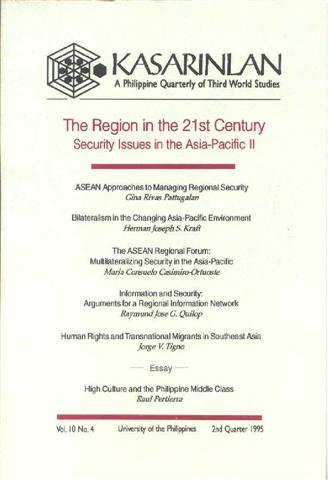Human Rights and Transnational Migrants in Southeast Asia
Abstract
PattugalanThe ASEAN is one of the regional organizations whose usefulness have outlived the Cold War. By investing in institutions and developing norms, its member-states have overcome obstacles to regional political stability and cooperation in the old order. With the demise of bipolarity and the emergence of a more complex post- Cold War security environment, however, ASEAN faces the twin challenges of remaining a relevant and formidable regional actor and fostering a wider regionalism beyond the confines of Southeast Asia. In this new regional security configuration, the association needs to expand regional security dialogue to include actors in the wider Asia-Pacific through the ASEAN Regional Forum; broaden the application of its code of conduct, the TACSEA, to cover the entire Southeast Asian region, transform Southeast Asia into a nuclear-weapons-free zone as well as a zone of peace, freedom and neutrality and get the cooperation of countries with nuclear capabilities, and pursue a self-reliant and collective military pressure.
Kraft
The Security structure of the Asia-Pacific during the Cold War is characterized by a web of interlocking bilateral alliances woven by the United States. Through this ‘hub and spokes’ mechanism, American influence in the region was guaranteed as states dealt with one another by means of their respective bilateral linkages with Washington. This arrangement effectively prevented regional states and actors from challenging the hegemony of the United States over the conduct of regional security affairs.
The end of the Cold War, the consequent decline of American military presence in the region, and the emergence of new geostrategic players have made this network of bilateral alliances inadequate, if not outdated, for the complex and uncertain post-Cold War international system. This, in turn, necessitates a rethinking of bilateralism and its place in the new regional security environment. With Philippine-United States Relations as backdrop, it is argued that until multilateral mechanisms are designated to help diffuse crises and, in conditions of conflict, actually enforced the uneven distribution of power among states will continue to provide the reason for small states to seek the assistance of stronger states through bilateral security arrangement. Bilateral alliances with neighbors and other regional actors, should therefore, be enhanced with the view of complementing multilateral efforts towards security cooperation. In the last analysis, however, while bilateralism remains an important aspect of Asia Pacific security, a collective effort is indispensable for ensuring regional stability.
Ortuoste
With the Cold War over, the Asia-Pacific region is in a state of flux. The emerging regional security environment excludes both uncertainty and optimism, even as traditional conceptions and principles of security have become inadequate, if not obsolete, begging for a thorough reexamination and redefinition. It is clear, however, that in the post Cold War world, security can no longer be achieved merely by the bilateral, much less unilateral, actions of states but also through coalition-building and multilateral endeavors. The ASEAN Regional Forum, with its emerging role as a facilitator of dialogue and a key instrument for the development of confidence-building measures for the region, appears headed towards creating a breakthrough in multilateralzing regional security. The challenge is for ARF participants to consolidate their gains and build on the ARF process. To meet the challenge, member-states need to agree on a collective vision for the ARF; the pacing of its activities; the degree of its institutionalization; the extent of its membership; and the nature of its linkages with sub-regional and global processes.
Tigno
The economic, social, and political dynamism of Southeast Asia has generated a heightened sense of awareness among the peoples and governments of the region of the critical linkage between human rights and transnational migrants. This increased sensitivity to the question of migrant rights, however, leaves much to be desired in terms of their concrete realization and actual enforcement by ASEAN states. Fundamental tension areas include the question of state sovereignty and the universality and consistency of human standards to be applied to migrants. Another difficulty is the non-adoption, non-ratification, and outright non-enforcement of existing standards and provisions. To resolve these problem-areas and advance the migrant rights agenda, ASEAN states and the international community at large, including civil society actors, must harmonize standards and engage in confidence- and consensus-building through dialogues and other forums
Quilop
In the information age, the ability to gather, process and disseminate information plays vital part in the enhancement of regional security. Information being the strategic resource in the 21st century, ASEAN member-states must recognize the indispensability of information-sharing and strive to install a regional information network by interlinking their respective national information systems. Despite potential drawbacks, the establishment if a regional information network will give ASEAN states a sense of community and certainty thereby inducing greater cooperation, transparency and interdependence among them.
Pertierra
Much of what is problematic about Philippine society is related to the undeveloped role of the middle class. Lacking in both material and linguistic capital, members of the middle class are unable to fulfill their role as the nation’s cultural entrepreneurs. Due to the weakness of the middle class, the possibilities for constructing a viable national imagination are significantly reduced and societally flawed. Instead, this imagination is dominated by the elite which views culture as mere form of display or by the masses which sees culture as only as expression of collective and primordial sentiments. Until the middle class is able to play a more significant role in the constitution and the popularization of culture uninformed elitism and popular misconceptions will continue to undermine Philippine society.
Published
2008-06-05
How to Cite
TIGNO, Jorge V..
Human Rights and Transnational Migrants in Southeast Asia.
Kasarinlan: Philippine Journal of Third World Studies, [S.l.], v. 10, n. 4, june 2008.
ISSN 2012-080X.
Available at: <https://journals.upd.edu.ph/index.php/kasarinlan/article/view/876>. Date accessed: 28 aug. 2025.
Section
Features
By submitting a manuscript, the authors agree that the exclusive rights to reproduce and distribute the article have been given to the Third World Studies Center.



